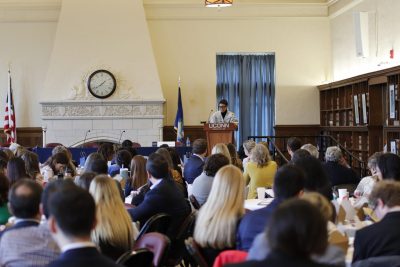CPILJ 2023 Symposium: Are Parental Rights Always in the Best Interest of Children?

This article was written by Taylorann Vibert, Student Writer at the UConn School of Law. The full article can be found here.
Questions about parental rights can be far more complex than they might appear at first glance, according to panelists at a UConn Law symposium. They agreed that the subject requires a nuanced and empathetic discussion of the parent-child relationship and an examination of the different contexts of education, health care and the family.
The symposium, entitled “Are Parental Rights Always in the Best Interest of Children?,” took place March 31, 2023, in the Reading Room of William F. Starr Hall. The student-run Connecticut Public Interest Law Journal organized the event.
Before the panel discussions began, Anne Dailey, the associate dean for faculty development and intellectual life at UConn Law, said a few words about the role of free speech at a public learning institution and acknowledged a group of protesters who gathered at the entrance to the law school.
“We are committed to ensuring a campus atmosphere in which freedom of inquiry, thought, expression and peaceful assembly are protected,” Dailey said, adding that the symposium sought to encourage an exchange of ideas.
In opening remarks, UConn Law Dean Eboni S. Nelson expressed gratitude for the community’s willingness to seek understanding of the complex parent-child legal relationship and to engage in important discussions about it.
“There has been much debate and discussion here in Connecticut, and indeed throughout our country, examining the complicated theoretical and doctrinal issues related to [laws governing parents and children] and their implementation and impact on children, parents, families and society as a whole,” Nelson said. The symposium, she said, would serve as a forum for those inquiries.
Dailey moderated the first panel, which discussed parental rights in the context of debates over school curriculum. The speakers distinguished the relationships that exist between parent and child from the relationships between student and school. Through this lens, panelists touched on the movement that opposes teaching critical race theory, the possibility of judicial intervention in decisions about school curricula, and the deployment of the parental rights argument to intervene in what is taught.
The panel featured Professor LaToya Baldwin Clark from the UCLA School of Law; Professor Matthew Shaw of Vanderbilt Law School; and Cailin Millat, Climenko Fellow at Harvard Law School.
The second panel, which examined the policing of gender-affirming care, was moderated by UConn Law Professor Susan Schmeiser. The speakers discussed their scholarship and practice, which focus on LGBTQ+ legal issues in connection with parental rights.
The panelists included Patience “Polly” Crozier, senior staff attorney at GLBTQ Legal Advocates and Defenders; Professor Greta LaFleur of Yale University; and Laura A. Rosenbury, president-elect of Barnard College and former dean of the University of Florida Levin College of Law.
Following the second panel, Professor Melissa Murray of NYU School of Law delivered the keynote address. Murray, whose expertise is in constitutional law, family law, criminal law, and reproductive rights and justice, also serves as a legal analyst for MSNBC and co-hosts Strict Scrutiny, a podcast about the Supreme Court and legal culture.
Murray asked the audience to consider the role of individual rights more generally in the American constitutional order and to think about what propels judicial recognition of rights, such as parental rights, that are unenumerated yet nonetheless deemed fundamental.
“The [historic] recognition of robust constitutional protections for family autonomy, parental rights in particular, also proceeds from an anti-totalitarian, pro-democracy logic,” Murray said. “But in recent years, this logic has been turned on its head. Today, the logic of parental rights has been invoked to cripple and dismantle the prospect of a multiracial democracy on the ground that diversity and pluralism are problematic, threatening, and even tyrannical.”
Murray also described the use of parental rights to intervene in education as an obstacle to the cultivation of citizens and future leaders who are invested in and prepared to defend democracy and democratic values.
“It is not just a question of whether parental rights are in the interest of children but whether parental rights are in the interest of all of us,” she said.
The third panel, moderated by UConn Law Professor Nadiyah J. Humber, explored family regulation, specifically child welfare, and asked why parental rights arguments play out differently for families of color than they do for white families.
The panelists were Jessica Dixon Weaver, associate dean for research and professor of law at SMU Dedman School of Law; Professor Clare Huntington from Fordham University School of Law; Professor Catherine Smith of the University of Denver’s Sturm College of Law; and Professor Shanta Trivedi, faculty director of the Center for Families, Children and the Courts at the University of Baltimore School of Law.
The symposium exceeded the expectations of co-symposium editors for the Connecticut Public Interest Law Journal, Emily Leen and Danielle Erickson.
“Danielle and I feel honored to have been given the opportunity to organize an academic symposium on a topic of such current interest and importance. We were blown away by the knowledge and expertise of all of our distinguished panelists and our keynote speaker, Professor Melissa Murray,” Leen said.
Erickson added: “Rigorous debate is necessary, particularly on a topic as complex as parental rights, and we were excited to play a role in facilitating those discussions. We cannot thank UConn Law, Dean Nelson, Associate Dean Dailey, (Events Director) Deb King, and the Connecticut Public Interest Law Journal enough for their support and encouragement throughout this experience.”